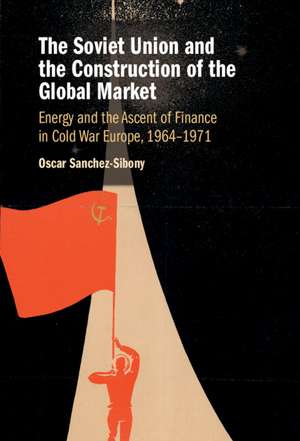The Soviet Union and the Construction of the Global Market: Energy and the Ascent of Finance in Cold War Europe, 1964–1971
Autor Oscar Sanchez-Sibonyen Limba Engleză Hardback – 13 sep 2023
Preț: 592.67 lei
Preț vechi: 651.28 lei
-9% Nou
Puncte Express: 889
Preț estimativ în valută:
113.41€ • 121.27$ • 94.56£
113.41€ • 121.27$ • 94.56£
Carte tipărită la comandă
Livrare economică 18 aprilie-02 mai
Preluare comenzi: 021 569.72.76
Specificații
ISBN-13: 9781108834544
ISBN-10: 110883454X
Pagini: 290
Dimensiuni: 237 x 159 x 22 mm
Greutate: 0.52 kg
Editura: Cambridge University Press
Colecția Cambridge University Press
Locul publicării:Cambridge, United Kingdom
ISBN-10: 110883454X
Pagini: 290
Dimensiuni: 237 x 159 x 22 mm
Greutate: 0.52 kg
Editura: Cambridge University Press
Colecția Cambridge University Press
Locul publicării:Cambridge, United Kingdom
Cuprins
List of Figures; Introduction; Prologue: The Grain Crisis, 1963; Chapter 1. Italy, Cold War Maverick; Chapter 2. Great Britain: Bretton Woods and the Financial Fix; Chapter 3. Austria: Bretton Woods and the Soviet Politics of Liberalization; Chapter 4. West Germany: Betrayal, Stagnation, and the Triumph of Capitalization; Chapter 5. France: The Travails of Institutionalization; Coda. Italy, Cold War Straggler; Bibliography; Index.
Recenzii
'Oscar Sanchez-Sibony liberates the study of the Soviet Union by stepping outside the shadow of the American academy. In The Soviet Union and the Construction of the Global Market, he circles the USSR to see it from the perspective of southern and western Europe. He finds that the force driving global markets in the 1960s was none other than Soviet traders and diplomats. An impressive and convincing work that sheds new light on globalism today.' Kate Brown, Thomas M. Siebel Distinguished Professor of the History of Science, Massachusetts Institute of Technology
'The commercial and financial barriers of Bretton Woods starved the Soviet Union of that most precious of resources, the US dollar. In the 1960s, the Soviets began to break down these barriers, exporting oil and tapping global capital markets. With a shrewdness reminiscent of Dos Passos, Sanchez-Sibony reveals how the Soviets eroded Bretton Woods from the East and, in doing so, helped seed our own unsettled times.' Stefan J. Link, Associate Professor of Economic History, Dartmouth College
'Oscar Sanchez-Sibony's new book is about the role of the Soviet Union in, as he puts it, 'the dismantling of our previous era.' To describe it as a contribution to the new wave of economic history does not do it justice. It is that, but also so much more - more capacious and more precise, more provocative and more satisfying, and engagingly written too.' Lewis H. Siegelbaum, Jack and Margaret Sweet Professor Emeritus of History, Michigan State University
'The commercial and financial barriers of Bretton Woods starved the Soviet Union of that most precious of resources, the US dollar. In the 1960s, the Soviets began to break down these barriers, exporting oil and tapping global capital markets. With a shrewdness reminiscent of Dos Passos, Sanchez-Sibony reveals how the Soviets eroded Bretton Woods from the East and, in doing so, helped seed our own unsettled times.' Stefan J. Link, Associate Professor of Economic History, Dartmouth College
'Oscar Sanchez-Sibony's new book is about the role of the Soviet Union in, as he puts it, 'the dismantling of our previous era.' To describe it as a contribution to the new wave of economic history does not do it justice. It is that, but also so much more - more capacious and more precise, more provocative and more satisfying, and engagingly written too.' Lewis H. Siegelbaum, Jack and Margaret Sweet Professor Emeritus of History, Michigan State University
Notă biografică
Descriere
Tells the story of how the Soviet Union helped bring about the financialized world of capital we live in today.
